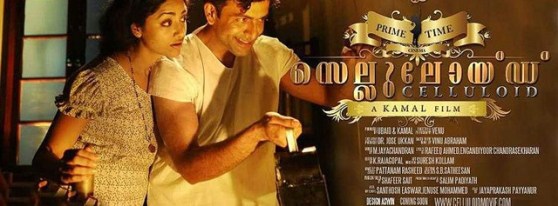The Vampire Bat didn’t really have much of a luck to witness awesomeness for sometime; and he has been so disappointed that he wished to let the Vampire Crocodile do the rest of the movie watching and reviewing. But the twist of fate which followed him for centuries has struck one more time. The movie was Celluloid and the Vampire Bat was more than just impressed. He felt the 2008 movie Thalappavu again; the same feeling of Raama Raavanan and Melvilasom – he was at that moment, not sure whether to be in pain with the protagonist or to feel the strength and power of what was created by the life and fate of the central characters of these movies. Now one more movie joins this group of three – the trilogy of awesomeness got transformed into the fabulous four today; something which should have happened long ago, but was delayed by some horrible intrusion of new generation movies and the prejudice by a few very old generation fans.
Kamal’s Celluloid is not an entertainer for the mindless, but it is not an art cinema either. It has its moments of fun and tears, never dragging too much to bring the element of boredom. The result is a beautiful tribute to J. C. Daniel, now realized as the father of Malayalam cinema and Vigathakumaran a.k.a The Lost Child, the first Malayalam feature film. It is not a lesser tribute to the first Malayalam heroine P. K. Rosie either. It also has the reference to the second feature film in Malayalam, Marthanda Varma – the first Malayalam movie based on a literary work and history. Even as the movie travels through the ages, there is no loss of flow and there is no appearance of flaws. All the ages are represented with their suitable features, not exaggerating at any moment. There is visible presence of truth and sincerity throughout the depiction of pre-independence and post-independence India – these elements have been clearly lacking in most of the self-proclaimed realistic movies.
There is also the mention of the Lumiere Brothers – Auguste and Louis; their L’Arrivée d’un Train en Gare de la Ciotat or Arrival of a Train at a Station; that short silent film with no intentional camera movement and powered by one continuous real-time shot. It surely made itself realistic, but not the self-glorified new generation movies. Celluloid might be more old generation than the most, but it has enough to make one feel and follow its path. While the hyped new generation movies claim the same, and gives fake emotions powered by stylish camera shots and bad language, the fact is that it is not everyone’s reality. When they do so, it is the complete rejection of the common man. As they might not have done the earliest filmmakers in history proud with the absence of substance and the presence of nonsense, there is another particular addition to it, as the quick impact on their fate is much less an impact compared to the deep impact which is to come. As the world didn’t end in 2012, there might be many generations to follow, and they are going to use “what Prometheus gave them” on many movies, and among the movies which will have honour and glory instead – there will be Celluloid.
Coming back to the movie of the year so far; it is the story of J. C. Daniel, the man who wished to make the first Malayalam cinema. He is seen as a determined young man who has set out with a clear aim in his mind. With the help of his wife Janet and his friends, he sets out on a mission which is made nearly impossible as there are not many heroines available unless they try a man in a female role. Even the available actresses would be from Bombay or other parts of India who would charge so much for him to provide. He does try one of them, but the demands are found to be too much. Finally, they end up casting a lower caste woman – an act which doesn’t interfere with the quality of the movie, but does affect the minds of the upper caste orthodox people who couldn’t digest such a woman doing the role of an upper caste lady. This happens to be a huge turning point – a decision which would affect the progress of the movie in the theatres of 1920s and begin the troubles. The reaction of the influential upper caste would be too hostile for Daniel to handle.
The unavailability of female cast to act in movies and the caste based attitude would continue while Daniel goes off to live in Tamil Nadu after selling off most of his assets including his own house and there is no clue about Rosie whose hut was burned by the hooligans forcing her to run away. The dream had lost its wings. He starts a new life as a dentist, but that too is shattered due to his love for movies which continued to follow him. His practice as a dentist soon ends, making the situation worse. There is the mention of movies which followed during the later periods, like Chemmeen, Achanum Bappayum and Narasimham. As time moves on, it is Daniel’s later struggles and the attempts of Chelangatt Gopalakrishnan to bring the government’s attention to the situation of the pioneer of Malayalam movies which take the centre stage. But the absence of the film reels of the movie and his stay in Tamil Nadu was not to make the situation easier.
Prithviraj has come up with a brilliant performance – his best since Thalappavu. He has fitted so well into the young protagonist, his older self and the son of the protagonist. There is no point where he failed to impress. Chandni, who has debuted as Rosie, Mamta Mohandas as Janet , Sreenivasan as Chelangatt Gopalakrishnan – all of them have fit into the characters so well; even considering the movie in movie which looked like a realistic recreation of what the first Malayalam feature film might have been. The number of real-life movie figures are numerous; Dadasaheb Phalke – the father of Indian cinema, R. Nataraja Mudaliar who made the first silent film in Tamil (Keechaka Vadham) and so on. Another notable person mentioned in the movie is D. W. Griffith, the American film director. Charlie Chaplain is also frequently mentioned, and his movie The Kid is seen to be shown at the theatre which seemed like the most powerful of the inspirations. But Daniel’s work became a social drama which wouldn’t be acceptable to the society which was rooted in orthodoxy.
In simple words, what is Celluloid? It is the history of Malayalam cinema from its humble beginning to what it is now. It is also the story of one person who tried so hard to make this dream happen. Malayalam movie industry which had such humble beginnings has the big responsibility to carry on that legacy. The first Malayalam feature film was a revolution; it was the silent movie which gave life to Malayalam on the screen even with no single word spoken. It was also a voice of the change which was to come in the caste system; that feature film was an indirect voice of the subaltern which was silent; a contradiction for sure. But all these were submerged; like the legendary island of Atlantis. But now we know the person. As Paulo Coelho has let us know through his Alchemist, “It’s the possibility of having a dream come true that makes life interesting.”. He had his dreams and he fought for it. This tribute has been overdue for such a long time, and this movie has finally brought justice. One can’t help not being without pain for J. C. Daniel, but its time to take a bow. Its an honour to have known you – thank You Kamal. The experience is divine for a movie fan, especially if you watch that many Malayalam movies.
Release date: 15th February 2013
Running time: 130 minutes (estimate)
Directed by: Kamal
Starring: Prithviraj, Mamta Mohandas, Chandni, Sreenivasan, T. G. Ravi, Nedumudi Venu, Siddique, Sreejith Ravi
@ Cemetery Watch
✠The Vampire Bat.



Pingback: 2013 in Review | Movies of the Soul: Reviews
Pingback: Where Did They Go? | The Tea Cerebrations
Pingback: Onam Special Movies | The Tea Cerebrations
Pingback: The Game of Three | The Tea Cerebrations
Pingback: Warriors of Facebook | The Tea Cerebrations
Pingback: November the Fourteenth | The Tea Cerebrations
Pingback: Malayalam Cinema: Beginning | The Tea Cerebrations
Pingback: Two Countries | Movies of the Soul [MOTS] :: Latest Reviews
Pingback: Did I Really Do It? | The Tea Cerebrations
Pingback: Invisible Actor | Movies of the Soul [MOTS] :: Latest Reviews
Pingback: Vimaanam | Movies of the Soul: Best of Cinema